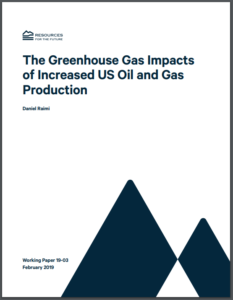Full Title: The Greenhouse Gas Impacts of Increased US Oil and Gas Production
Author(s): Daniel Raimi
Publisher(s): Resources for the Future
Publication Date: February 1, 2019
Full Text: Download Resource
Description (excerpt):
High levels of US oil and gas production are projected to increase domestic and global GHG emissions substantially.
Increased oil and natural gas production in the United States has decreased domestic natural gas prices and global oil prices, with major economic and environmental consequences. The resulting greenhouse gas (GHG) impacts have received substantial attention, with most focus on natural gas and relatively little on oil. In this paper, I provide a more comprehensive estimate of how increased production affects these emissions through changes in the US energy mix, associated methane emissions, and—crucially—global oil prices. Under a high oil and gas production scenario, US GHG emissions in 2030 are roughly 100 to 600 million metric tons of carbon dioxide equivalent (2 to 10 percent) higher than under a low production scenario with a range of assumptions about methane emissions. Under the high production scenario, lower global oil prices and increased consumption raise global carbon dioxide emissions in 2030 by roughly 450 to 900 million metric tons relative to a low production scenario, equivalent to 8 to 16 percent of projected US GHG emissions in 2030. This global projection assumes that OPEC or other nations do not coordinate production cuts to offset US gains. It also does not include domestic and global welfare effects of increased US production, which may be positive because of welfare gains from lower energy prices.
Comparing a high and low oil and gas production scenario, US emissions are 2% to 10% higher in 2030.
Non-US CO2 emissions are 450 million metric tons higher, similar to the 2016 fossil fuel emissions of Brazil.
The greenhouse gas impact of increased US oil production may be more substantial than increased gas production.
Differences in US GHG emissions under different scenarios are driven by methane, rather than carbon dioxide emissions.
